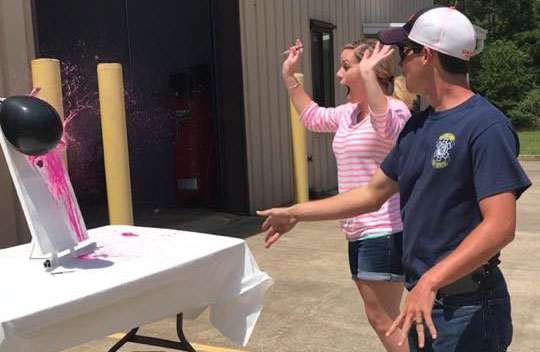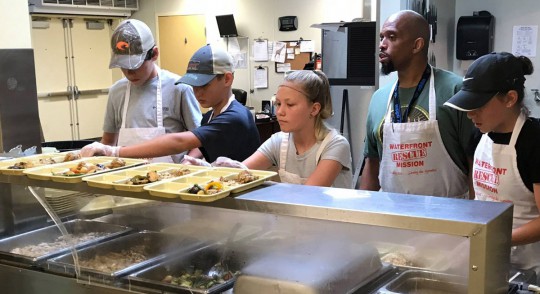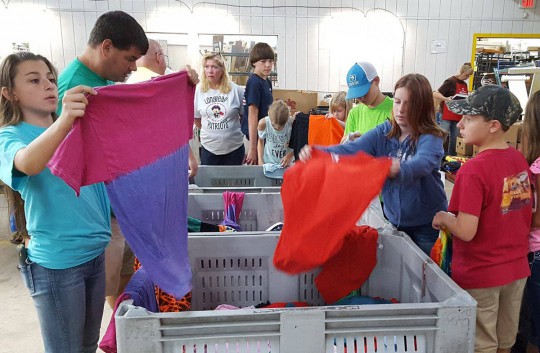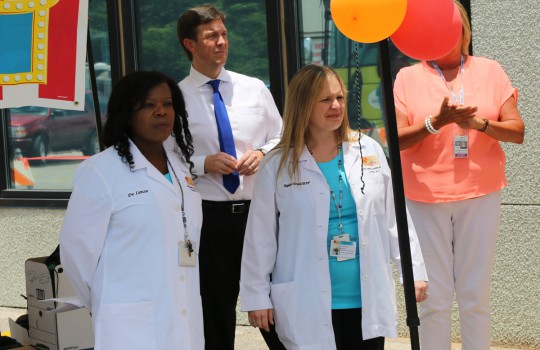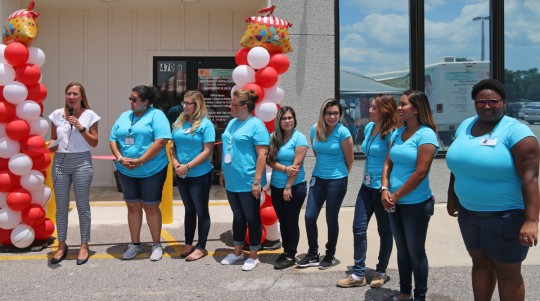Boy Or Girl? Volunteer Firefighter Family Finds Out At Gender Reveal
June 11, 2017
An Escambia County volunteer fireman and his wife were right on target with a “gender reveal” Saturday afternoon at the Century Fire Station.
Clay and Destinie Smith are expecting their second child in December. They were joined by friends, family and firemen for the reveal that involved popping black balloons filled with paint. A couple of dart throws later, the couple knew from the pink paint that they were expecting a little girl.
The Smith’s first child, a boy named Braxton, is 16 months old. Their daughter is due on Christmas Eve. They have a few name ideas in mind, but nothing certain yet..
Photos for NorthEscambia.com, click to enlarge.
Tate, Northview Players Named To All-State Softball Teams
June 11, 2017
Miracle Sports, the official website of Florida high school softball, has named several Tate and Northview players to their 2017 all-state teams.
The Escambia County area’s only First Team players are in Class 7A with senior outfielder Hayden Lindsay and sophomore utility player Shelby Ullrich, both Tate Aggies. The Aggies also had junior pitcher Hannah Brown named to the 7A Second Team and a Honorable Mention placement by Belle Wolfenden.
In 1A, Northview pitcher Tori Herrington and senior outfielder Peighton Dortch were named 1A Second Team, while Chiefs Kendall Enfinger, Aubree Love and Jamia Newton received honorable mentions.
CLASS 7A
First Team
OF Hayden Lindsay, Tate
UTIL Shelby Ullrich, Tate
Second Team
P Hannah Brown, Tate
Honorable Mention
Belle Wolfenden, Tate
Class 1A
Second Team
P Tori Herrington, Northview
OF Peighton Dortch, Northview
Honorable Mention
Kendall Enfinger, Northview
Aubree Love, Northview
Jamia Newton, Northview
Pictured top: Northview High School’s Tori Herrington. NorthEscambia.com file photo, click to enlarge.
First Baptist Church Of Cantonment Youth Spend Week Serving
June 11, 2017
The youth at the First Baptist Church of Cantonment spent their Vacation Bible School week serving other groups that help the less fortunate in our communities.
On Youth Missions Week Day 1 the group volunteered to sort food at the Manna Food Bank. On day two, it off to help prepare and serve lunch at the Waterfront Rescue Mission. Day three was a Wednesday well spent helping out at the Waterfront Thrift Store, and day four was a big cleanup at The Living Room, a nonprofit on Mobile Highway that reaches out to feed and meet the other needs of the less fortunate.
Pictured top: First Baptist Church of Cantonment youth serving lunch at the Waterfront Rescue Mission last week. Pictured below: Sorting clothing at the Waterfront Thrift Store and sorting food at the Manna Food Bank. Photos for NorthEscambia.com, click to enlarge.
Florida Gov’t Weekly Roundup: ‘Cardiac Kids’ Go Home From Tallahassee
June 11, 2017
Legislative sessions often follow a similar script.
They start with high hopes, get sidetracked in disagreements and posturing and then, like a miracle, come together in grand bargains.
That was pretty much the story of the special session that ended by cocktail hour Friday.
 The story started a week earlier when Gov. Rick Scott, House Speaker Richard Corcoran and Senate President Joe Negron appeared at a news conference in Miami to announce plans for the special session. After months of bickering, Scott and Corcoran had agreed on a deal to boost funding for public schools and economic development. Negron? Well, his involvement in the news conference became a matter of debate.
The story started a week earlier when Gov. Rick Scott, House Speaker Richard Corcoran and Senate President Joe Negron appeared at a news conference in Miami to announce plans for the special session. After months of bickering, Scott and Corcoran had agreed on a deal to boost funding for public schools and economic development. Negron? Well, his involvement in the news conference became a matter of debate.
But as the session started Wednesday, the drama had started to build. Senators were unhappy. Democrats tried to ramp up the storyline of dysfunctional Republican leadership. News stories raised the specter of the session collapsing.
Then came Friday, the final day of the special session. And out of the backrooms came a compromise that Scott, Corcoran and Negron supported. At 4:42 p.m., the session ended.
“We call ourselves the cardiac kids,” Corcoran said. “We get you guys all worked up, and then we come to a nice smooth landing and we accomplish a tremendous amount of policy.”
GOING BACK TO SCHOOL
Most lawmakers like to tell the folks back home about how the Legislature has increased funding for public schools. But when lawmakers returned to their districts after the regular session ended last month, they faced a blowback for not putting enough money into schools.
The state budget approved at the end of the regular session included only a $24.49 per-student increase in the main funding formula for public schools.
Scott took the highly unusual step of vetoing the portion of the budget that includes the formula, known as the Florida Education Finance Program, or FEFP, and making increased education funding a centerpiece of the special session. Scott and legislative leaders agreed to an additional $215 million for the FEFP — which translates into an increase of $100 per student.
“These dollars are greatly needed, severely needed. If we had not done this, if we had not had the work of (Senate Appropriations Chairman Jack) Latvala and others to get these extra dollars, three weeks from now school districts would be laying off people and cutting programs, quite frankly,” said Sen. Bill Montford, a Tallahassee Democrat who is CEO of the Florida Association of District School Superintendents. “And that’s not the sky’s falling, that’s the reality of it.”
The increased funding drew bipartisan support during the special session, with the House and Senate overwhelmingly passing an FEFP bill (HB 3A). But arguments about education funding and policy continued to linger, largely because of a massive bill, commonly known as HB 7069, that passed at the end of the regular session.
Corcoran, the main architect of the bill, has called HB 7069 the “greatest educational K-12 policy that we’ve passed in the history of the state.”
But critics are pressuring Scott to veto the bill, which they contend would hurt traditional public schools because of changes involving such issues as charter schools and Title I funding that goes to schools in low-income areas.
Not exactly on the same page as Corcoran, Sen. Gary Farmer, D-Fort Lauderdale, called HB 7069 “the most horrific public- education bill to ever pass the Florida Legislature. It will hasten the privatization of our public schools.”
JOBS, JOBS, JOBS (AND A DIKE)
Scott and Corcoran feuded for months about the future of economic-development efforts, with the House wanting to do away with the business-recruitment agency Enterprise Florida and slash funding for tourism-marketer Visit Florida.
To Scott, the programs were crucial to carrying out his “jobs, jobs, jobs” mission. To Corcoran, they were dens of “corporate welfare” and questionable spending.
But going into the special session, it looked like Scott and Corcoran had a plan to bridge their differences. The Legislature, in part, would provide $76 million to Visit Florida — up from $25 million approved during the regular session — and put more restrictions on the agency’s operations and contracting.
Also, lawmakers would create an $85 million “Florida Job Growth Grant Fund,” which would provide money for infrastructure projects and job-training programs to help in economic development. The House could say it didn’t give in on its opposition to providing money for direct business incentives, while Scott could say he got economic-development tools he needed.
Big picture, that’s what ended up in a bill (HB 1A) that passed Friday. But the bill also picked up a couple of other issues — money for repairs to the Herbert Hoover Dike around Lake Okeechobee and money for higher-education projects — that became necessary to, in Corcoran’s words, bring the session in for a landing.
The bill came together Friday, a day after Negron, in somewhat-uncharacteristic fashion, said the Senate wouldn’t agree to a deal reached between Scott and Corcoran without concessions. Negron also pushed back against what he described as a “fake narrative” that he was involved in negotiations leading up to Scott’s decision to call the session, saying the House and the governor hammered out the agreement.
“We’re glad that they’re coming together and that they’re reaching common ground, but we’re not just going to rubber-stamp an agreement that two parties made without our priorities being taken into account,” Negron said.
The final details emerged early Friday afternoon after behind-the-scenes negotiations.
The Senate got at least part of what it wanted — $60 million for higher-education projects across the state. Scott had vetoed $75 million of such projects from the budget that lawmakers passed during the regular session, angering Senate leaders. The special-session deal will restore funding for projects, though at somewhat lower amounts.
Meanwhile, Scott also got something he wanted — $50 million to help speed up repairs to the dike around Lake Okeechobee. The U.S. Army Corps of Engineers is in charge of the project, but Scott in recent months has pushed for shortening the schedule of the work.
In the end, Scott appeared to get what he wanted during the three-day special session, with lawmakers approving the money for schools, economic development and dike repairs.
“I’m excited to travel the state and brag about what got accomplished in the special session,” Scott said at a news conference after the session ended.
MAYBE SOME RELIEF
Like with public-school funding, lawmakers went home after the regular session and faced criticism for not reaching agreement on a plan to carry out a November constitutional amendment that broadly legalized medical marijuana.
A major part of the backstory is that marijuana businesses see Florida as a potentially lucrative market and have been lobbying and maneuvering to be better-positioned than their competitors. A key sticking point between the House and Senate during the regular session was about how many retail stores the marijuana operators should be able to run.
But the special session provided another chance for lawmakers to negotiate the regulatory framework for the industry. And Friday afternoon, they received overwhelming approval of a bill (SB 8-A) that includes increasing the number of businesses that can receive medical-marijuana licenses and allowing each of those businesses to initially have up to 25 retail stores.
House Majority Leader Ray Rodrigues, who shepherded the measure through his chamber, said lawmakers “have a responsibility and a duty” to implement the amendment, approved by more than 71 percent of voters, or else the regulatory framework would be decided by the courts.
The constitutional amendment made medical marijuana legal for what is expected to be hundreds of thousands of patients with debilitating conditions. That is a dramatic increase from the limited types of patients who have access to cannabis under laws passed in 2014 and 2016.
“The House did not get everything the House wanted and the Senate did not get everything the Senate wanted,” but the compromise bill is one “that both of us can live with and is actually very good policy,” Rodrigues, R-Estero, said before the bill was approved.
But medical marijuana still could end up the courts because of part of the bill that bans smoking cannabis, effectively requiring patients to find other ways to receive the treatment.
Orlando trial lawyer John Morgan, who largely bankrolled the constitutional amendment, pledged to fight the smoking ban.
“I do care about smoke, and I will sue them because of that,” Morgan told The News Service of Florida in a telephone interview Friday afternoon. “It clearly was called for in the amendment, and so what they’ve done for me is allowed me to step back up on my soapbox and go get what the people of Florida wanted when they passed this bill with 71 percent.”
STORY OF THE WEEK: Florida lawmakers finished a special session Friday with a deal that included increased funding for schools and economic development and a plan to carry out a medical-marijuana constitutional amendment.
QUOTE OF THE WEEK: “It doesn’t feel right. It doesn’t look right. You and I know that.” — Sen. Jeff Brandes, R-St. Petersburg, arguing against part of a bill that would require health officials to give preference for up to two medical-marijuana licenses to businesses currently or previously involved in “the canning, concentrating, or otherwise processing of citrus fruit or citrus molasses.”
by Brandon Larrabee, The News Service of Florida
Wahoos Fall To Mississippi
June 11, 2017
Pensacola Blue Wahoo fans were shown again Saturday why the 22-year-old right hander Tyler Mahle is considered the team’s ace.
The No. 10 prospect in the Cincinnati Reds organization pitched six scoreless innings and tied his career-high with nine strikeouts.
 It appeared Pensacola was going to win, 2-0, when center fielder Gabriel Guerrero singled in two runs in the bottom of the eighth inning with the Southern League-leading saves leader Jimmy Herget entering the game in the ninth. Instead, the Mississippi Braves rallied to score four runs and overcome Pensacola, 4-2, in front of the 10th sellout crowd of the season of 5,038 at Blue Wahoos Stadium.
It appeared Pensacola was going to win, 2-0, when center fielder Gabriel Guerrero singled in two runs in the bottom of the eighth inning with the Southern League-leading saves leader Jimmy Herget entering the game in the ninth. Instead, the Mississippi Braves rallied to score four runs and overcome Pensacola, 4-2, in front of the 10th sellout crowd of the season of 5,038 at Blue Wahoos Stadium.
Pensacola manager Pat Kelly said the Blue Wahoos emotions went from feeling on “top of the world” to everything “falling apart.”
“Sometimes you just have those nights,” Kelly said of Herget, who gave up the runs and blew his third save opportunity of the season. “In your life as closer, you have to have a real short memory. There’s a pretty good chance he will be out there tomorrow.”
Mahle, who was seeking his Southern League eighth win, also brushed off the loss.
“Next time he’ll get the save,” Mahle said of Herget. “That’s just baseball. It happens.”
Mahle and Kelly were also not ready to panic with eight games left in the first half of the season. Pensacola leads the Southern Division with a 35-27 record and is vying to become the first team since the Tennessee Smokies to win four straight halves. The Smokies did it from 2009 to 2011.
Despite Pensacola losing Saturday, Biloxi lost 5-2, to the Jacksonville Jumbo Shrimp and are tied for second with Mississippi at 32-30, which is three games behind Pensacola.
“We just have to win the next two series, 3-2,” Kelly said. “I think we’re in pretty good position.”
The 23-year-old Guerrero, who was selected for the Southern League All-Star game, punched a line drive over the first baseman’s head into right field with two outs that scored both shortstop Blake Trahan and third baseman Josh VanMeter to give the Blue Wahoos a 2-0 lead.
But five of the first six batters Herget faced reached base on a walk, single, double and two more singles. Mississippi batted around in the inning. Braves catcher Kade Scivicque drove in the first run for Mississippi with a double that scored third baseman Travis Demeritte, who leadoff the inning with a walk to start the onslaught.
Mahle wasn’t the only impressive pitcher on the mound Saturday. Mississippi Braves right-hander Mike Soroka, a 19-year-old ranked the No. 4 prospect in the Atlanta Braves organization, also pitched well.
He threw seven scoreless innings, allowing four hits, no walks and striking out four. Soroka has now thrown 15 scoreless innings in his past two starts.
“Those were two pretty good pitchers right there,” Kelly said.
New Pediatric Medical, Dental Clinic Opens In Cantonment
June 10, 2017
A new children’s pediatric and dental clinic is now open in Cantonment.
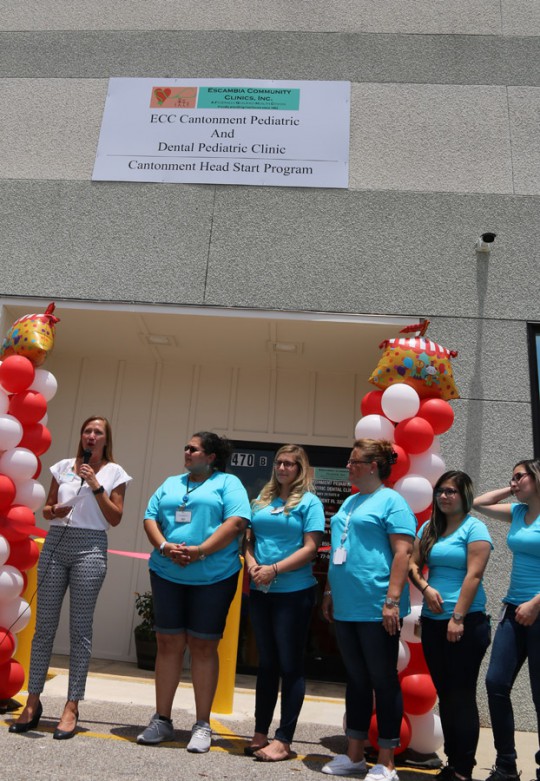 Escambia Community Clinics celebrated the opening of their newest site, ECC Cantonment Pediatrics and Pediatric Dental Clinic, with a ribbon cutting ceremony and a children’s carnival Friday at 470 South Highway 29 in Cantonment — in the old Winn Dixie building.
Escambia Community Clinics celebrated the opening of their newest site, ECC Cantonment Pediatrics and Pediatric Dental Clinic, with a ribbon cutting ceremony and a children’s carnival Friday at 470 South Highway 29 in Cantonment — in the old Winn Dixie building.
ECC Cantonment Pediatrics provides pediatric medical, pediatric dental and behavioral health care in one convenient location, allowing for easy access to important care for children and families. A wide range of pediatric services are available, such as well-baby and well-child checkups, immunizations, routine physicals, diagnosis and treatment of illnesses, and management of allergies, asthma and ADHD.
Pediatrician Dr. Quetheline Lanza and Stephanie Howell, ARNP provide medical services for the practice.
Pediatric behavioral health services provided by a licensed clinical social worker include family counseling and assistance coping with issues such as ADHD, bullying, divorces and separations, trauma, adjusting to chronic medical conditions, anxiety and depression.
ECC Cantonment Pediatrics location also offers dental care for children and young adults, ages 0 to 20, and provides dental exams, dental X-rays, dental cleanings/dental hygiene, dental extractions, fillings and tooth restorations, dental sealants and fluoride varnish, and oral health education.
ECC Cantonment Pediatrics and Pediatric Dental Clinic is now accepting calls for medical and dental appointments Monday through Friday during business hours at 850-780-0111. Same-day appointments may be available for medical and dental appointments, depending on the clinic schedule. ECC is a Humana and Molina Medicaid provider, accepts DentaQuest dental coverage and many private insurances.
This is ECC’s second location in Cantonment. Adult primary care services are available at ECC’s Cantonment Medical Center, located at 748 Highway 29 in Cantonment.
NorthEscambia.com photos, click to enlarge.
Man Convicted Of Kidnapping, Sexual Battery
June 10, 2017
A man faces up to life in prison for attacking a woman last year in Escambia County.
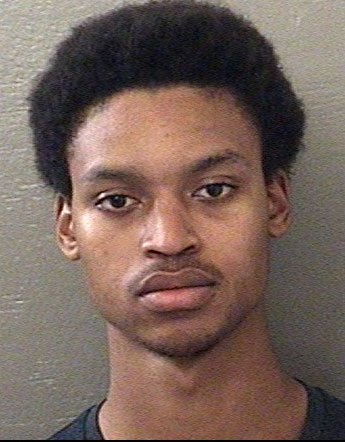 A jury convicted Sammie Lee Smith IV, age 20, of one count of sexual battery with deadly force likely to cause serious personal injury, kidnapping, domestic battery by strangulation, and two counts of battery.
A jury convicted Sammie Lee Smith IV, age 20, of one count of sexual battery with deadly force likely to cause serious personal injury, kidnapping, domestic battery by strangulation, and two counts of battery.
On June 9, 2016, the victim was standing outside with a co-worker at her place of employment when Smith showed up unexpectedly. Smith took her cell phone and retreated to his vehicle. The victim followed him into the vehicle to retrieve her phone. Once inside the vehicle, the defendant demanded the password to her phone. When she refused to give it to him, he started hitting her.
She then attempted to get out of the vehicle. Smith grabbed the victim and locked the doors to the vehicle. He then drove to an isolated area where he began to beat the victim, strangled her to the point of breathlessness, and sexually battered her. Eventually, Smith allowed the victim to leave the car. The victim returned to work and law enforcement was called. Smith was arrested several days later in Ft. Pierce, Florida, his place of residence.
Circuit Court Judge Edward P. Nickinson scheduled sentencing for August 29, 2017. Smith faces up to a life sentence with a minimum mandatory of 50 years in prison. Smith will be designated a sexual offender.
Lawmakers Sign Off On Florida Medical Marijuana Deal
June 10, 2017
Florida will have 10 additional marijuana operators — more than double the number of the state’s current vendors — within four months, under a medical marijuana proposal approved by lawmakers Friday.
The Legislature signed off on the compromise measure, which limits each marijuana company to 25 retail stores across the state, after failing to reach consensus during this spring’s regular legislative session on how to implement a medical-marijuana constitutional amendment overwhelmingly approved by voters in November.
 Back in town this week for a three-day special session originally focused on funding for education and economic development, lawmakers — under intense pressure to revisit the marijuana issue — scurried to iron out differences that blew up a deal during the regular session.
Back in town this week for a three-day special session originally focused on funding for education and economic development, lawmakers — under intense pressure to revisit the marijuana issue — scurried to iron out differences that blew up a deal during the regular session.
After it became apparent that Republican legislative leaders were close to sealing a deal on the pot bill, Gov. Rick Scott added it to the special session, which ended late Friday afternoon.
A disagreement about how many dispensaries the pot operators should be allowed to run caused a potential deal to collapse six weeks ago.
The Senate had wanted to limit the number of retail outlets to 15 per operator, arguing that such a cap would give new businesses time to ramp up and compete with the state’s already active seven marijuana vendors. The House, meanwhile, preferred a much more expansive approach, with a cap of up to 100.
House Majority Leader Ray Rodrigues, who shepherded the measure through his chamber, told colleagues Friday that lawmakers “have a responsibility and a duty” to implement the amendment, approved by more than 71 percent of voters, or else the regulatory framework would be decided by the courts.
The constitutional amendment made medical marijuana legal for what is expected to be hundreds of thousands of patients with debilitating conditions. That is a dramatic increase from the limited types of patients who have access to cannabis under laws passed in 2014 and 2016.
“The House did not get everything the House wanted and the Senate did not get everything the Senate wanted,” but the compromise bill is one “that both of us can live with and is actually very good policy,” Rodrigues, R-Estero, said before the House’s 103-9 vote in favor of the proposal (SB 8-A) Friday afternoon. The Senate later signed off on the measure with a 29-6 vote.
The legislation would allow local governments to ban marijuana storefront operations. But if retail outlets are permitted, cities and counties couldn’t impose limits on the number of storefronts, disparagingly called “pot shops” by critics.
Sen. Rob Bradley, who has been a key figure in the development of medical marijuana legislation for the past three years, acknowledged that the local government issue was sticky for some county officials as well as some “incumbent” marijuana operators.
But an even bigger source of contention — especially for Democrats — is that the bill bans smoking marijuana products.
Supporters of the constitutional amendment, known as Amendment 2, insist that it included a provision that permits smoking. That provision spelled out where smoking is banned.
“Nothing in this section shall require any accommodation of any on-site medical use of marijuana in any correctional institution or detention facility or place of education or employment, or of smoking medical marijuana in any public place,” the amendment reads.
House and Senate Republican leaders have refused to allow patients to smoke marijuana as a treatment option, citing a number of reasons, including concerns expressed by law enforcement officials.
But Orlando trial lawyer John Morgan, who largely bankrolled the amendment, has pledged to take the state to court over the issue.
“I do care about smoke, and I will sue them because of that,” Morgan, who is mulling a run for governor, told The News Service of Florida in a telephone interview Friday afternoon. “It clearly was called for in the amendment, and so what they’ve done for me is allowed me to step back up on my soapbox and go get what the people of Florida wanted when they passed this bill with 71 percent.”
Morgan said the language in the amendment was intended to quash the specter of people smoking pot on the street.
“It was a way to put a sock in the mouth of these bulls— artists who were saying that,” he said.
Morgan brushed off questions posed by some lawmakers about whether the amendment expressly permits smoking, saying a 3-year-old “can figure out if you’re not allowed to smoke in public, what does that mean? You are allowed to smoke in private.”
“A judge and a jury will understand this perfectly,” he said.
by Dara Kam, The News Service of Florida
Special Session Ends After Deal Reached
June 10, 2017
Hours after a special session about education and economic development seemed on the verge of falling apart, legislative leaders and Gov. Rick Scott on Friday struck a last-minute agreement salvaging their priorities but setting off renewed criticism over backroom dealing.
The agreement gave each of the three sides at the Capitol — Scott, the House and the Senate — something that could be called a victory.
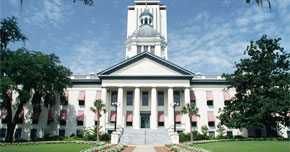 Scott got essentially all of what he called for during the session: $215 million in additional spending on public education, $161 million for economic development and tourism marketing and $50 million for repairs to the Herbert Hoover Dike around Lake Okeechobee.
Scott got essentially all of what he called for during the session: $215 million in additional spending on public education, $161 million for economic development and tourism marketing and $50 million for repairs to the Herbert Hoover Dike around Lake Okeechobee.
Those moves reversed a series of stinging rebukes to Scott during this year’s regular session, which ended in May with the governor getting little of what he requested.
“I’m excited to travel the state and brag about what got accomplished in the special session,” Scott said at a joint press conference after the three-day special session ended.
At the same time, legislation approving Scott’s priorities hewed closely to the House terms, including an insistence that education property-tax bills not rise with property values. In the deal, the Senate received $60 million for higher-education projects that Scott vetoed in the Legislature’s original budget. The governor said Friday night that he would approve the projects this time.
Lawmakers also approved legislation setting the framework for the state’s growing medical-marijuana industry after a voter-approved constitutional amendment broadly legalized the product. Scott said he would “absolutely” sign the bill.
The deal emerged after a 30-minute harangue late Thursday from Senate President Joe Negron, R-Stuart, who told reporters that the Senate would need more concessions from Scott and the House for the session to end successfully.
That led many observers to predict that lawmakers might miss the Friday evening deadline to end the session, much as they needed overtime to finish the state budget in May following a similarly chaotic process.
“We call ourselves the cardiac kids,” said House Speaker Richard Corcoran, R-Land O’ Lakes. “We get you guys all worked up, and then we come to a nice smooth landing and we accomplish a tremendous amount of policy.”
Negron played down suggestions that his rant, somewhat out of character for the buttoned-down Senate president, provided a jolt to the negotiations.
“I think what happened is that we made a decision that there was a way for everyone to win, and most importantly for the people of Florida to win,” he said.
But private negotiations over the spending measures revived criticism from the regular legislative session that too much wheeling and dealing took place behind closed doors. The Florida Democratic Party slammed the outcome of the special session as the result of “dirty, backroom politics.”
“What we’re seeing here are three men and a handful of unelected staffers making major policy decisions behind closed doors without any opportunity for open discussion or public input,” Democratic Party spokeswoman Johanna Cervone said in a statement. “Why do we even bother electing the full Legislature if a handful of power-brokers will make all of the decisions in secret?”
Scott also brushed off suggestions that the path to a deal included an agreement to sign a higher-education measure (SB 374) favored by Negron, or a controversial and wide-ranging public education bill (HB 7069) that is a priority of the House. Those bills passed during the regular session.
The governor said Friday he was still considering whether to sign or veto the proposals.
The House still has not sent HB 7069 to Scott for his signature or veto. But the measure, which deals with everything from charter schools to teacher bonuses, played a major role in the education debates throughout the special session.
Senate Democrats on Friday called on Scott to veto the bill, saying it would help charter schools at the expense of traditional public schools.
Critics also said the bill would offset benefits of the extra funding approved during the special session. The extra funding amounts to a $100 per-student increase in the budget year that begins July 1.
“It’s an increase — but at what cost?” asked Rep. Cynthia Stafford, a Miami Democrat who pointed out that funding for education is still short of pre-recession levels when inflation is factored in. “The state has recovered, but education funding has not.”
by Brandon Larrabee, The News
Scott Signs ‘Stand Your Ground’ Change
June 10, 2017
A measure changing the state’s controversial “stand your ground” self-defense law was among 16 bills that Gov. Rick Scott signed into law late Friday.
T he self-defense bill stemmed from a Florida Supreme Court ruling in 2015 that said defendants have the burden of proof to show they should be shielded from prosecution under the “stand your ground” law. In “stand your ground” cases, pre-trial evidentiary hearings are held to determine whether defendants should be immune from prosecution.
he self-defense bill stemmed from a Florida Supreme Court ruling in 2015 that said defendants have the burden of proof to show they should be shielded from prosecution under the “stand your ground” law. In “stand your ground” cases, pre-trial evidentiary hearings are held to determine whether defendants should be immune from prosecution.
The bill (SB 128) shifts the burden of proof from defendants to prosecutors in the pre-trial hearings. Supporters of the bill, such as National Rifle Association lobbyist Marion Hammer, said shifting the burden of proof would better protect the rights of defendants.
“The `burden of proof’ bill restores the presumption of innocence in self-defense cases,” Hammer told The News Service of Florida this week. “It puts the burden of proof back on the state, where it belongs.” But labeled by Democrats as a “a shoot to kill” bill, critics have argued that the change could lead to cases ending before all the facts are revealed and that the bill would increase costs for state attorney’s offices.
Among the other bills signed Friday by Scott was a measure (SB 436) dealing with religious expression in schools. The measure, which the American Civil Liberties Union has described as “troublesome,” seeks to prevent school districts from discriminating against students, parents or school employees on the basis of religious viewpoints or expression. Sen. Dennis Baxley, an Ocala Republican who sponsored the bill, said during this spring’s regular legislative session the bill “isn’t protecting a faith. It’s protecting all people’s freedom to express their hearts.”
by The News Service of Florida


